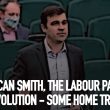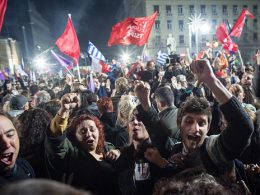By Liberdade, Socialismo e Revolução (our sister organisation in Brazil)
So far, the year 2021 has brought no relief from the ills of 2020. Rather, the problems have worsened. The second wave of the pandemic is more intense than the first, with the average number of deaths again exceeding a thousand a day, while government policy leads to the collapse of health care and delays the vaccine.
Food prices keep rising, at the same time as unemployment soars. And, there is no longer any emergency aid, weakening the chances of an effective quarantine policy.
It had been clear for months that a second wave was coming to Brazil, but nothing was done to prepare for it. The field hospitals were dismantled when quarantine measures were relaxed. The governments’ line was that normality was returning and more and more restrictions on economic activities were being lifted.
According to Datafolha, 62% of the population thinks that the pandemic is out of control and this, together with the delay of the vaccine, has contributed to a fall in Bolsonaro’s popularity.
This criticism applies to all administrations. The governor of São Paulo, João Doria, who is now trying to pose as the Saint George figure leading the fight against the corona dragon, postponed the resumption of lockdown measures. He travelled to Miami in the midst of the second wave, and had to come back and apologise.
Criminal health policy
The policy of the Bolsonaro government was and continues to be criminal and genocidal. The government was always in denial about the seriousness of the pandemic, with Bolsonaro continuing to promote gatherings with his unmasked supporters. As the government dismantled measures that would relieve the effect of a new lockdown, such as emergency aid, its social base, spurred on by its rhetoric, fought any measure to halt economic activities. At the same time, Bolsonaro and the health ministry continued to sell the lie that there was a miracle cure for Covid, such as chloroquine.
On 10 December, Bolsonaro gave a speech in Porto Alegre where he said: “Allow me to talk a little about the government, that we are currently in the final stages of the pandemic. Our government, taking into account other countries in the world, was the one that did best, or one of the ones that did best in the pandemic.”
The truth is that Brazil has the second highest number of deaths in the world. As the former rector of the Federal University of Pelotas, Pedro Hallal, notes in an article in The Lancet:
“With 211 million people, the Brazilian population represents 2.7% of the world population. If Brazil were responsible for 2.7 percent of global Covid-19 deaths (i.e., acting as the world average in fighting the pandemic), 56,311 people would have died. However, as of January 21, 2021, 212,893 people have died from Covid-19. In other words, 156,582 lives have been lost in the country because of the low performance.”
The most dramatic effect of this genocidal policy was seen in the catastrophic situation in Amazonas state. As in the other states, despite the seriousness of the second wave, the Amazonas government only implemented tougher lockdown measures after Christmas, so as not to disrupt trade. But even these measures were withdrawn after protests instigated by a mix of disaffected small traders and Bolsonaristas.
The number of inpatients rose rapidly, and with it the number of deaths. When the collapse of the health system was imminent and it was warned that oxygen would run out, the federal government did nothing but send more hydroxychloroquine.
This at the same time that it was revealed that the health ministry had developed an app, TrateCOV, which by filling out an electronic form with the patient’s symptoms, would indicate the prescription of drugs such as hydroxychloroquine, chloroquine, ivermectin, azithromycin and doxycycline at any age, including for babies, and in various situations, not only for Covid-19.
These drugs have their use and their risks, but not for Covid. Self-medicating with drugs that have no effect against Covid-19 is inflicting harm on many people such as arrhythmia, bleeding, and even deaths, as shown in a report in the newspaper Folha de São Paulo on January 24. The app was taken offline and the health ministry blamed hackers for launching it, but could not deny the content.
The agonising scenes in Manaus hospitals, with people choking to death from lack of oxygen — something as basic to the health system as flour to a bakery — have spread around the world. Now we see the collapse of health care also in Rondônia and Roraima.
The pressure and crisis was so deep that it is possible that Minister of Health, Eduardo Pazuello will be sacked. The Attorney General’s Office asked for an investigation to be opened into Pazuello’s actions and Supreme Minister Lewandowski authorised it. But Pazuello is only applying the line defended by Bolsonaro. Any blame that Pazuello certainly bears, is also Bolsonaro’s responsibility.
Bolsonaro’s priorities became clear when he vetoed the section of the Budget Guidelines Law (LDO) that ring-fenced health and measures against Covid-19 from cuts in the 2021 budget. Instead, the government protected military spending, with billion-dollar spending to develop atomic submarines and the acquisition of cargo ships. Guns yes, lives no. Defeating Bolsonaro will save lives.
The mirage of the vaccine
The pandemic showed the worst of the capitalist system, but it also gave a glimpse of what was possible. In record time, vaccines were developed against this new disease. But the system, based on competition and profit, poses obstacles at every turn. Even with a considerable amount of research funded by governments and in partnership with universities, these private companies will defend their right to patents and to make a profit, rather than share this knowledge that will save millions of lives. Moreover, this quest for profit is mixed with the political interests of the major imperialist powers, who use “vaccine diplomacy” as they used to use “gunboat diplomacy”.
There are 270 different initiatives to develop vaccines around the world. If there was a policy of collaboration and coordination of research, testing, production and distribution, the process could be much more agile. Now it will probably take years for immunisation to be completed in poor countries.
But even in this current context, Brazil could have fared better if it had a policy of investment in science and public production of medicines. The country has two large institutes for vaccines and public universities, as well as one of the largest public vaccination programmes in the world. Even so, it imports 95% of vaccine doses.
The neglect of science in the country is not new. Previous governments have been blamed for the lack of investment for a long time. But the situation has worsened in recent times with the spending cap brought in under the Temer government, which prevents increases in investment.
With investment since the beginning of the pandemic, it would have been possible to develop a vaccine here. Now the country depends on technology transfer, which according to the contract with Sinovac (from Coronavac) and astraZeneca will only come from the second half of the year, to have its own production of vaccines.
Bolsonaro has been downplaying the vaccine issue from the beginning. He even disavowed Pazuello when he talked about buying Coronavac, which Bolsonaro called “Doria’s Chinese vaccine”. Now that the pressure for the vaccine, including from the business community, has grown, Bolsonaro talks about “the vaccine being Brazil’s”. After repeatedly souring relations with China, with attacks from Eduardo Bolsonaro, Ernesto Araújo and Abraham Weintraub, the government now says that it was its intervention that allowed the import of materials from China and that the government has “great relations with China”.
The government is now promoting its own “vaccine diplomacy” and has expanded the priority group for vaccinations by 25 million people to 77 million, including industrial, construction workers and truck drivers among the priority groups. The fact is that there is not enough vaccine, not even for the first sector of the first priority group: those who work on the front line of healthcare, the elderly and other high-risk groups, including indigenous and other marginalised communities.
There is no planning and control, despite months of preparation. The government has not even managed to buy needles and syringes. Pazuello now talks about there being an avalanche of proposals, but the concrete proposals that had been made were ignored. Pfizer, the first to have the vaccine released worldwide, offered the vaccine to the government, which denied it, saying that 2 million vaccines in the first quarter would be “too little” and “disappointing for the people”. But in fact there will only be large-scale vaccination in the second semester.
It is also necessary to have social control over the distribution of vaccines, to avoid “jumping the queue” and ensure that the vaccine reaches the poorest communities, and with the criteria of saving lives, not economic interests. We also cannot accept “jumping the queue” through parallel imports by private companies. The vaccines available must follow a public national priority plan.
All this has to be part of the process of building a structure of participation of entities and movements that represents social movements, unions and universities, to fight the pandemic. This should include carrying out a plan of quarantine with compensation measures to ensure that no one is left behind. We need an immediate investment in SUS (the Brazilian Public Health System), by opening more beds and also by placing private beds under SUS control, to be used where necessary. It is not just a matter of treating the pandemic. Due to lack of beds, many operations are being postponed, causing suffering and increased threat to life.
A programme of investment in research and science is also needed, along with the capacity to produce the necessary materials for vaccines. We do not know if vaccines will have a lasting effect, or if annual vaccination will be required, as in the case of influenza. This must go hand in hand with the nationalization of the pharmaceutical sector and the breaking of patents. Medicine is to save lives and care for health, not generate profits.
Unemployment and Hunger
It is not only in health that the government and the system as a whole fails. The unemployment rate reached a record high in the third quarter, 14.6%, according to IBGE’s PNAD Continuous, or 14.1 million people. This is on top of rising food prices, which last year rose three times faster than general inflation (14% for food, 4.5% for official inflation) and the end of emergency aid payments during the pandemic. According to Datafolha, 69% of those who received emergency aid have not found another source of income to replace it.
This points to an increase in misery and hunger for a large part of the population and makes more evident the need to fight for price controls on the basic food basket, the return of emergency aid and the fight against unemployment.
The closing of the three Ford car factories (Camaçari-BA, Taubaté-SP and Horizonte-CE) in the country is an example of how big companies act. Like other automakers, Ford has received billions in subsidies and incentives. According to an estimate of the Federal Revenue Service, Ford received R$20 billion in tax incentives since 1999. According to a Folha de São Paulo survey, automakers in total received R$69 billion in incentives since 2000. Now Ford, as others have done, thanks them by laying off 5,000 workers, with many other jobs affected in the production and services chain. According to a study made by the government of Bahia, the state’s economy may lose R$5 billion as a result of the closing of Ford’s plant.
The metalworkers’ union is correct in organising a vigil at the Taubaté plant to prevent the machines being removed. Every job must be defended, but we must also demand that Ford factories be nationalized under the control and management of workers’ representatives. These are machines and buildings already paid for by the public authorities and there are many skilled workers there. All this can be put to work producing vehicles for public transport, ambulances, developing electric cars or other goods, and developing a plan to reverse the process of deindustrialisation. But this will require a major struggle to break the logic of the current system.
Chaos in education
After almost a year of the pandemic, it is clear that governments have not prepared a safe return to school. Many months could have been used to invest in education, but in fact little was done. There are still thousands of schools that do not even have running water. This situation tends to increase inequality in education, as those who have trouble-free access to the internet, or study in state-of-the-art private schools, have managed to adapt to the situation, while the majority have fallen further behind.
The return to school cannot only be a government decision. Educators, staff, parents and students have to be able to decide if there are safe conditions for the return to school. This year’s ENEM (Brazil’s standardised state exams) followed the same line. Far from being the “success” claimed by the Minister of Education, the ENEM was marked by record abstention, 51.5% on the first day and 55.3% on the second. This while thousands were barred from entering classrooms that were already full in several cities.
All this highlights the need to invest in education at all levels, breaking the logic of spending caps, quota restrictions and cuts. Access to higher education must be expanded in public, free and quality universities. The struggle, including the possibility of strikes, against an unsafe return to classes, will be an important focus of struggle in the coming period.
Only through struggle can we stop these attacks
Despite the worsening of the pandemic, we need to seek ways to fight. Last weekend we saw rallies against Bolsonaro in dozens of cities.
At some point this will mean taking the struggle to the streets. Last year we saw the eruption of important struggles around the world. In Bolivia, the struggle in August was key to defeating the coup plotters in the elections. Also, in Chile, the resumption of the struggle was instrumental to the overwhelming victory in the referendum on the abolition of the constitution. In Nigeria, Colombia and France there were major protests against police violence. In Poland, the movement in defence of the right to abortion. In Argentina, a great victory for the women’s movement. In India we saw the biggest general strike in history, with 250 million people out on strike. In Belarus there were months of struggle against the electoral fraud promoted by the Lukashenko regime. In the US, we saw the largest movement in the country’s history, Black Lives Matter, against structural racism, police violence and the Trump administration.
At some point we will see similar explosions in Brazil. Social tensions are only getting worse and will find some channel of expression. We need to prepare for this, taking initiatives to fight where it is possible, raising a programme that shows an alternative path. The Bolsonaro government is under pressure and has fallen in the latest polls, with even sectors of the right discussing the possibility of impeachment, even organising rallies against the government.
Bolsonaro’s response is a combination of trying to do some backtracking, buying support in Congress and threatening coups. What happened in the US on January 6, with the invasion of the congressional building, the Capitol, was a warning. Bolsonaro follows the same logic of not accepting defeat, whether in the elections in 2022, or even before, in the case of the arrest of any of his children or attempts to remove him from power. It is not by chance that he wants to arm his base.
So, while we are in favour of any measure that could put an end to his government, whether by an impeachment, or any other legal means, we cannot depend on or wait for the institutions to move.
We cannot leave our future in the hands of the right-wing forces, which even though they are in opposition to the government today, are the same ones who orchestrated the coup in 2016 and have been the main ones responsible for all the neoliberal attacks in recent years: the spending cap, labour reform, outsourcing, pension reform, etc.
The working class and its organizations need to take the leading role to defeat Bolsonarismo and neoliberal policies. This must come via the resistance we are already waging today, accumulating our power for united struggles. A further day of protests is being planned for 31 January and 01 February. March 8 will certainly be a central day of struggle. The struggle of women has played a powerful role in the resistance against the attacks of the right all over the world and also here in Brazil.
But to move forward in this struggle, we have to build a program that defends our class and oppressed layers in all their diversity, but also points a way out of this nefarious system. A new report by Oxfam shows that the increase in wealth of the 10 richest men in the world, who saw their wealth grow by US$540 billion (almost R$3 trillion) in the middle of the pandemic, would be enough to pay for vaccines for the entire world population and reverse all the increases in poverty in the world during the pandemic.
The failure of the capitalist system is becoming evident to an ever greater number of people. Millions of lives are being taken and threatened by pandemic and famine because of this system, which at every moment has been shown to put profits above life. Our task is to show that another world is possible, a socialist world.
Get Rid of Bolsonaro, Mourão and the neoliberal agenda!
We say:
- Immediate investment in health to guarantee vaccines for all. Social control over vaccine distribution. Open new beds for Covid-19, but also for other diseases, and hire more health workers. Invest in research and development of vaccines for production in the country through public institutions. Nationalise the pharmaceutical industry under workers’ control and management.
- Investment in education. Prepare for a safe return to school with investment in structure, hiring educators to ensure smaller classes. Ensure access to remote learning by providing computers/tablets and internet and adequate conditions for educators. Educators, staff, parents and students must have the power to veto the return to class if conditions remain unsafe.
- In defence of jobs, nationalize Ford and other companies that threaten to close factories and make mass layoffs.
- For the return of emergency aid. Reduction and control of basic food basket prices.
- For the end of the spending cap and other measures that prevent public investment.
- Against the prepared packages of attacks: administrative reform, “emergency PEC”, privatizations, etc.
- For taxation of the richest 1%: taxation of large fortunes, high incomes and profits of large companies.
- Break the economic power over society: nationalisation of the banks and financial system and the big companies that control the economy, under the control and management of workers’ representatives. Return to production to guarantee the needs of the population and in accordance with the preservation of the environment, not profit for a small elite.
- Defend our class and unite our struggles: against all forms of oppression, whether of gender, racial, ethnic or sexual identity and orientation.
- Build a socialist way out: for a workers’ government with a socialist programme. International solidarity and struggle for a socialist world.












